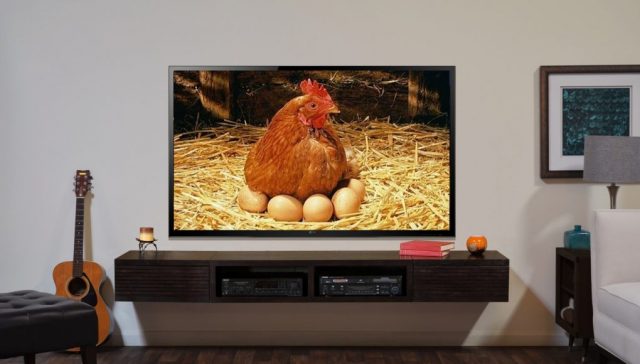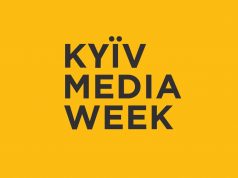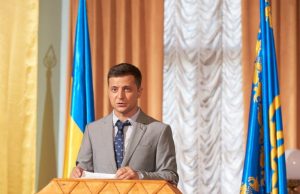If the pay TV market conference was positive and optimistic in general, then the “Television as a Business” conference participants were rather perplexed by what was happening on the market. The discussants seemed to found at least three negatives in the market per one positive change. Even those moments that they characterized positively turned out not so good upon closer view.
What was good in the market over the year, according to the industry representatives? The discussants call positive the adoption of the law supporting Ukrainian cinema. However, Vlad Ryashin, General Producer at Star Media Production Company, believes that the adoption of the law itself is not yet a victory for the industry, since it takes lots efforts to ensure its efficiency. “This is a plus, but still very small, so it has not become a real plus. There required changes to the Tax and Customs Codes, and we still have many battles ahead, including, for the budget line. When our country finds a nerve to include relevant industry parameters into the budget, then it will become a real plus”, as the Star Media’s CEO remarked.
“Pirates have government protection, – Alexander Bogutsky”
At the same time, the CEO of ICTV channel Alexander Bogutsky mentioned that the main point of that new law was its anti-piracy section. “Anti-piracy is a long stride toward the product investment protection”, as he stressed. However, according to the media manager, the law enforcement mechanism in terms of anti-piracy is a weak point so far. “What is the problem? When the law was passed, there existed the Intellectual Property Service. Today, it is gone. At that, the Ministry of Economic Development did not establish any unit in charge of signing a letter to providers. I believe that pirates have government protection”, as the CEO of the ICTV resumed.
Another positive aspect in the industry was mentioned the signing of a Ukrainian-Russian Coproduction Memorandum by the media groups, production studios and the National Broadcasting Council, which set rules in this area and, according to Mr. Ryashin, “showed that the industry is hard, but able to agree”.
A plus for the industry is the appearance of contacts with foreign content producers, facilitated by the State Film Agency and the National Broadcasting Council. This is about established cooperation with South Korea, India, China, and South America. “For the time being, they have not become a plus, but they can do it”, as Mr. Ryashin remarked.
“TV series production is a business without borders, – Yevgen Lyaschenko”
The continuing media group’s own content growth is also treated as a plus for the industry. In particular, the director of Media Group Ukraine Yevgen Lyaschenko pointed out that the own production development is the Group’s tomorrow, and it would have to become further basis of business in general. “Because when you buy content, your show it 1-2 times and that’s it. At that, if you produce content, so you accumulate a library and can already sell it. TV series production is a business without borders” as the media manager assures.
The General Producer of the TV channel TET Victoria Shulzhenko also added that the media groups would have to be guided by the principle of production companies when creating their content, i.e. to assess the potential sales of their own product at the initial stage. By the way, Mrs. Shulzhenko believes that her channel can become profitable within two years.
According to the CEO of ICTV, the important changes in the Must-Carry List have opened new horizons for the market players to monetize their business. “We finally, over 25 years of Ukrainian television’s life, have started receiving money from those who broadcast our content, i.e. from cable operators”, as Mr. Bogutsky observed. He also referred to the Polish market, where earnings from cable operators accounted for 30% of TV channels’ revenue many years ago.
“The introduction of language quotas on TV is a serious challenge for the industry, – according to TV market players”
So, what negative did conference participants notice in the TV industry development over the last year? Many negative aspects are associated with legislative initiatives and general engagement with the government. One of the major challenges for market players is the introduction of language quotas on television. At the same time, the media managers hesitate to forecast what that would result in, but they are already speaking out potential law enforcement difficulties.
“Who consumes content produced in any language? The people who speak this language. If we produce content in Russian, we can sell it to the CIS countries. This content can be acquired by channels and media platforms. The marketing feasibility of Ukrainian-language content is limited. And this is very bad for business”, as Mr. Lyaschenko believes.
Vlad Ryashin seconds him. “Unfortunately, we have to state that the Ukrainian-language content has to be traded in the Ukrainian-language market, and this market is not equal to the Russian-speaking global market. This means that the monetization potential is lost”, as the CEO of Star Media remarks. According to him, TV series in Russian, filmed in Ukraine, provide for investing a lot in their production precisely because of numerous options of their further sale. “They can be sold in the CIS and to various platforms. Instead of investing 50-60 thousand dollars for an episode, producers may invest some 150-200 thousand dollars”, as Mr. Ryashin stated.
“The problem of producing Ukrainian-language content is the lack of good actors, who perfectly speak Ukrainian. Therefore, the content quality will go for the worse, – Yevgen Lyaschenko”
Another option for the market to minimize risks from the language law is to produce content in English. “We filmed in English, believing that it is easier to distribute. It is really easier to distribute it. Indeed, it is traded better than our whole library, but has not been repaid yet. At that, the market is very heavy, and we are not expected there, there are many large players”, as Mr. Ryashin shared his experience. He also added that the industry relied on the government support for producing Ukrainian-language TV series; however, the Draft State Budget 2018 does not provide funds for TV series production.
According to media managers, another Ukrainian-language content production problem is the trivial lack of good actors who perfectly speak Ukrainian. “Actors who perform in a high-quality Ukrainian are less than in Russian. The content quality on TV channels will go for the worse”, as Mr. Lyaschenko observed.
“The Ukrainian piracy market in terms of economic volume is equal to the TV advertising one, – Vlad Ryashin”
In addition, among the shortcomings of market growth over the year, the discussants called general market overregulation, general disunity of the industry and continuing piracy growth, especially among online TV services. “And the growth of this sector should not be underestimated, because in terms of economic volume it is equal to the Ukrainian TV advertising market”, as Mr. Ryashin emphasized.
“Does the government want to finance chicken or culture? There must be partnership, not war, – Alexander Bogutsky”
In general, market players are anticipating the economic advance next year, which will lead to the market growth and the ability to produce high-quality content, as well as to improve the relationship between the industry and the government. “We all want to live in a country with a predictable future. The Ukrainian government should take a different position. Russian cinema is financed with hundreds of millions of dollars. Ukrainian channels live on the advertising budget, which is very low. Have you heard that the chicken producers got 1 billion hryvnyas from the budget? Are they poor people? What does the government want to finance: chicken or culture? There must be partnership, not war”, as Alexander Bogutsky voiced the TV industry’s opinion.

















